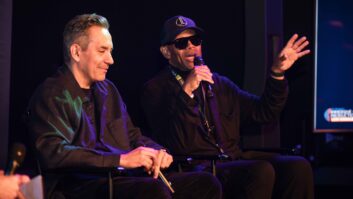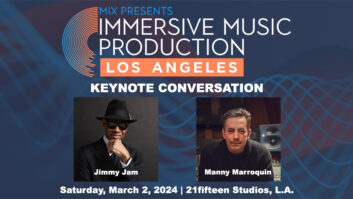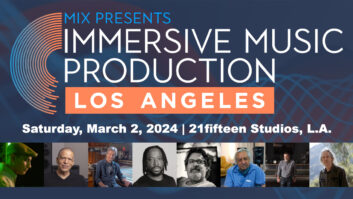LOS ANGELES, CA—There’s no denying that the music business is going through particularly challenging times. But, as the saying goes, when life gives you lemons, make lemonade; a recent panel discussion hosted by the California Copyright Conference, “A Survival Guide for the Future,” highlighted the opportunities available in the ever-evolving industry.
“Music is being listened to more than ever before, and the explosion of new technologies has created many excellent avenues to monetize music,” noted CCC president Shawn LeMone, of ASCAP. For example, “More music is being heard than ever, but it seems to be more and more in marriage with an AV experience.”
Patrick Russo, principal at the Salter Group strategic advisory firm, offered an overview of the financial well being of the music industry versus other entertainment sectors. “The good news is, despite what’s gone on around the world from a financial perspective over the last few years, and despite some challenges and changes in the industry, you can look at the entertainment industry as a whole and it has actually performed reasonably well,” he said. “At the end of the day, everybody wants to be entertained.”
Music publishing this past year was at $6.3 billion, said Salter. “That’s the first time we’ve seen a decline in publishing. A lot of that was declines in mechanical royalties [for sales of recordings] and, of course, the recession. It’s expected to grow, albeit at a slower rate than we’ve seen in the past.”
The recorded music side is not doing well. “Go back to 2004, it was a $28 billion industry; today it’s about a $20 billion industry. Unfortunately, that number’s going to decline.”
As for television, in 2004, it was a $251 billion industry globally, and today is worth $279 billion. “That’s despite one of the worst recessions we have seen in the advertising industry,” noted Russo. “What’s driving it is the growth in pay TV channels worldwide and new cable networks. In Europe last year, there was a net growth of 100 new channels. Those are opportunities to exploit your content.”
Music is also a component of the DVD/Blu-ray and video-on-demand businesses. DVD sales are declining—$25 billion, down from $30 billion in 2004— but Blu-ray sales were up 88 percent in the first half of 2010 and VOD up 23 percent over the same period.
Electronic delivery is on an upsurge. Video games, a $21 billion industry, has started adopting the delivery method. Launched in 2003, iTunes served its 10 billionth song in February 2010 and now accounts for 70 percent of online digital music sales. Pandora, Rhapsody and other streaming music services have seen increased business. And streaming video delivery service Hulu reached one billion views in a single month last year. Compare that to the 1.3 billion DVDs shipped over the entire year, said Russo.
Video games offer opportunities for music sales, noted Victor Rodriguez, music director for developer THQ. “There are basically three uses for music in videogames. We’ve all played Rock Band and Guitar Hero. Music is featured; it is the video game. Then you have creative use, not unlike a movie or television show, where you’re scoring a scene, and you have background music.”
More importantly, there’s the chyron: “They see that chyron come up with the band name and song title 50 or 60 times during game play, they remember it, go onto iTunes and purchase the album,” said Rodriguez.
Independent artist and songwriter Kari Kimmel acknowledged the importance of the chyron, having offset a low licensing fee with an onscreen graphic on a TV show. “I saw a huge rise in sales that month,” she reported.
This is an exciting time, especially for independent artists, according to Kimmel, who handles all her own business affairs, including licensing deals, and owns all her masters. “You can make the rules up as you go. There are so many outlets for getting your music out there.”
Russell Emanuel, CEO, Extreme Music, observed, “More and more name artists are looking to production music as an alternative source of revenue.” As a result, “We’re incubating new talent, breaking new ground, breaking areas of new music that historically haven’t made air. People are feeling much more ambitious with what they’ll put against shows.”
These days, he continued, “Shows are scoring entire episodes or series with production music. We’re now able to make the jump to soundtrack albums from library music. We just released a soundtrack album [for TV series It’s Always Sunny in Philadelphia] that went to #7 in the soundtrack album charts.”
Emanuel had his own story to tell about chyrons: “We did a lot of music in Jersey Shore and had chyrons. We sold 20,000 units last week for one single, and had 1.8 million views on YouTube for one of our artists. That’s a super-exciting change.”
California Copyright Conference
theccc.org







